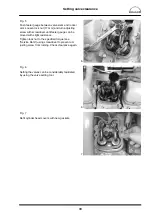
Turbocharger, troubleshooting
85
Before replacing the turbocharger, carry out the following checks
Turbochargers are frequently replaced if engine oil consumption is too high, power output too low or intake
or exhaust gas noises appear to be abnormal.
Subsequent inspections by the manufacturer of the supposedly defective parts frequently prove the turbo-
chargers to be in working order.
To ensure that only defective turbochargers are replaced in future, the following checks must be carried out
beforehand:
If oil consumption is too high
−
Check the air filter for contamination,
−
Ensure adequate engine room ventilation,
−
Check the intake pipework for restricted cross-section (caused e.g. by damage, contamination).
These causes give rise to increased oil consumption on account of the increased vacuum pressure at the
compressor inlet.
−
Check the outside of turbocharger for traces of oil.
Oil consumption caused by the turbocharger is dependent on bearing wear and results in relatively early
mechanical damage.
If engine power output is unsatisfactory
Ensure correct adjustment of
−
valve clearance
−
speed adjustment (to full load stop)
Also check the following:
−
the compression
−
the air filters for contamination
−
the charge-air pressure
−
the pressure in the inlet chamber of the high-pressure pump
−
the exhaust back pressure
If the above checks fail to establish a possible cause, check the turbocharger for:
−
coking in the turbine area, which impairs the movement of the wheel assembly
(can be eliminated by axial movement)
−
dirt in the compressor area
−
damage caused by foreign objects
−
scraping of the turbine rotor on the housing
If a significant amount of dirt has accumulated, clean the compressor end and check the bearing clearance.
Caution:
Do not damage the light alloy compressor wheel.
If there are abnormal intake or exhaust gas noises
−
Check the intake and exhaust system in the area of the charger group.
Defective seals can lead you to think the turbocharger is defective and must therefore be replaced.
−
If there are still unusual noises, check the bearing clearance.
Turbochargers in good working order do not make any excessive noise!
Summary of Contents for D 2840 LE 301
Page 1: ......
Page 2: ......
Page 16: ...Notes 14...
Page 20: ...Engine views 18 Engine views D 2842 LE 301 9 10 11 12 9 8 6 5 4 3 2 1 13 14 15 16 17 18 6 7 8...
Page 150: ...Notes 148...
Page 151: ...149 Service Data...
Page 179: ...177 Special tools...
Page 180: ...Special tools 178 2 3 4 5 6 7 8 1 6 1 6 2 6 3 9 1 9 2 9 3 9...
Page 184: ...Special tools 182 21 22 25 25 2 24 25 1 26 27 1 27 2 27 20 1 19 2 19 1 20 2 19 20 28 23...
Page 186: ...Special tools 184 30 29 32 31 33...
Page 193: ......
Page 194: ......
















































